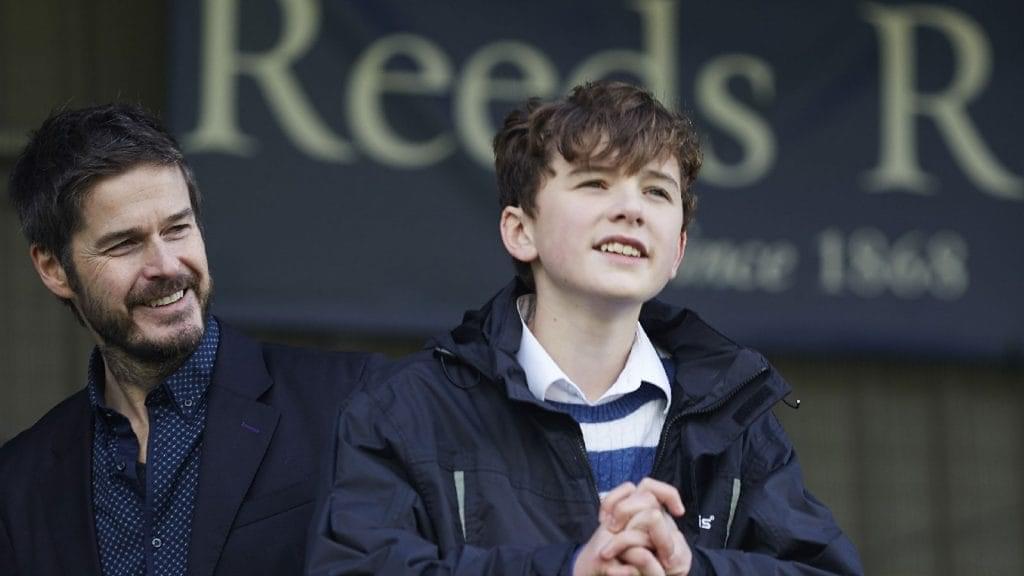
Vietnam. There has never been a historical event that has been analyzed so thoroughly, front and back, on film. We’ve seen the warfare(“Platoon”), the aftermath(“Coming Home,” “The Deer Hunter), and a film like “Apocalypse Now” which derived biblical meaning out of the war. Then there’s powerful films like “In Country” and “Jacknife” which showed the post-traumatic effects of life for soldiers back in America. Then there’s the wall, of which nothing more needs to be said, as chillingly portrayed in “Dear America: Letters Home From Vietnam,” which might be the best film about Vietnam ever made. It’s been a long time since we’ve seen a film on the subject of Vietnam. Towards the end of the cycle in the 1980’s, it didn’t seem that there was anything new to say on the subject, except that young men went to Vietnam and died there. The idea seemed tired back then, but it’s been so long now, and a film like “We Were Soldiers” arrives with a certain freshness. How does generation X feel about Vietnam?
“We Were Soldiers” focuses on Colonel Hal Moore(Mel Gibson), a real life figure, determined not to repeat the military mistakes of the past, namely those of Custer, and the French, whose own trip to Vietnam proved disastrous. He is Harvard educated and an expert in diplomacy, but a chain smoker no less, so we wonder if he can handle the pressure. We’re pretty sure he can, since it’s Mel Gibson, and this movie is based on a novel written by a real life war hero. One thing Moore has no illusions about is, of course, death, as he sizes up his four hundred man charge and wonders who will live, who will die, and why? What can he do to improve the odds?
The conflict they face takes place in an area known as The Valley of Death. There, in a tiny clearing, Moore and his men, all young fathers we’re reminded, and brothers, and sons, all elite soldiers, are surrounded and trapped by several thousand North Vietnamese soldiers. What happens next is pure bloodshed and brutality as the soldiers go down like flies, and then, unexpectedly, we cut over to the North Vietnamese, and see the whites of their eyes. These are not the faceless ghouls we’ve seen in other films, but we still wish they were dead anyway. I guess times haven’t changed that much.
The first third of “We Were Soldiers” is probably the weakest part of the film, where we get all of the obligatory introductions that are too reminiscent of the Jerry Bruckheimer model; not “Black Hawk Down” of course, but “Armageddon.” The mistake is assuming that we care more about the soldiers if they’re married with children, then if they’re not, but I don’t think it really matters once the movie settles down into the war bunker. In fact, none of the young soldiers are very interesting; there’s too many to give much time to each of them, and yet, when the soldiers die, it’s very moving, for probably the same reason we’re moved to tears by the mere sight of the Vietnam memorial: life is precious and we identify with faces and symbols in a way that’s indescribable. I mean, the names on the Vietnam memorial are just names, aren’t they? But it’s so overpowering.
“We Were Soldiers” works because of Gibson’s unflinching performance as Moore, shaky accent and all, as well as the intense, blow by blow, ingeniously mounted construction of the battles. Director Randall Wallace, who also adapted the novel, films the battle scenes in a way that you can see what’s going on, where everybody is, and what needs to be done. There are scenes in the film that rival those in “The Thin Red Line,” in the way we can clearly follow the strategy of the soldiers and their location as they attempt to make a move. Gibson does a good job of letting his “Lethal Weapon” action persona go, and instead allows his character to be scared. Gibson is able to project in Moore the self awareness that thirty years later, his actions, his decisions, would be dissected and scrutinized, and even written about. This is not a man who’s unaware of what others will say about him, much like Gibson himself appears to be in real life. Moore is painfully aware of the ripple effects of every decision he makes, no matter how minor.
“We Were Soldiers” is probably proof that old genres never die, they just need a little rest period. This is a good film; strong, honest, strikingly photographed(by Dean Semler) and appropriately devastating. It’s interesting that this is the only Vietnam film that has been made for the new teenage generation. How does “We Were Soldiers” compare with the other Vietnam films? It’s not on the level with the great films like “Platoon” and “Dear America: Letters Home From Vietnam” but it’s comparable with the others. In fact, it most closely resembles “84 Charlie Mopic,” the gritty 1989 film which chronicled a day in the life of a platoon and no more. I wonder how teenagers will feel about Vietnam after seeing “We Were Soldiers.” I have a feeling that for most of them, the idea of young men going to war and dying will be quite a shock.
